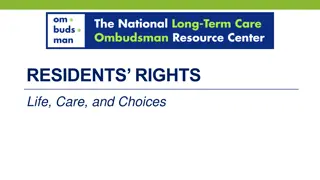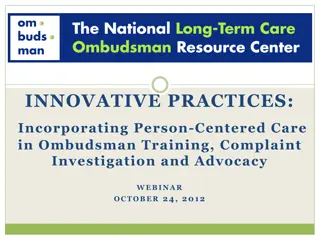Importance of Maintaining Individual Rights in Effective Care
Recognizing and upholding an individual's rights is crucial for providing effective care. It ensures the individual feels respected, valued, and supported, contributing to a trusting relationship. Failure to meet these rights can lead to negative consequences impacting the individual's well-being and overall care experience. Personal qualities like patience, understanding, and empathy play a significant role in delivering quality care.
Download Presentation

Please find below an Image/Link to download the presentation.
The content on the website is provided AS IS for your information and personal use only. It may not be sold, licensed, or shared on other websites without obtaining consent from the author.If you encounter any issues during the download, it is possible that the publisher has removed the file from their server.
You are allowed to download the files provided on this website for personal or commercial use, subject to the condition that they are used lawfully. All files are the property of their respective owners.
The content on the website is provided AS IS for your information and personal use only. It may not be sold, licensed, or shared on other websites without obtaining consent from the author.
E N D
Presentation Transcript
2 Give three reasons why it is important to maintain an individual s rights. (how will they feel?) 1 List some rights of individuals C C P E C 3 Explain what might happen in an individual s rights were not met. LO: To understand the personal qualities that contribute to effective care.
Write down all the personal qualities that you have (patience, kindness, understanding etc) LO: To understand the personal qualities that contribute to effective care.
LO2: Understand the personal qualities that contribute to effective care 16 Marks The qualities that contribute to effective care, i.e.: patience understanding empathy respect willingness sense of humour cheerfulness LO: To understand the personal qualities that contribute to effective care.
What messages were being communicated about the personal qualities of nurses?
Patience Show patience by: making time when an individual wants to tell you about their background and family life not rushing supporting individuals to carry out day-to-day activities at their own pace providing additional time when supporting an individual who has mobility difficulties (e.g. an individual in a wheelchair). repeating information when communicating with an individual who has dementia enabling understanding when an individual has difficulty understanding what you or others have said waiting when an individual is making their own choices and decisions. LO: To understand the personal qualities that contribute to effective care.
Patience How can it contribute to effective care? Care workers who are patient are less likely to get angry if a person asks the same question again and again, e.g. a small child in a nursery or a person with dementia. They will understand that some people need time to make up their minds about something, e.g. an elderly person choosing what to have to eat. Being patient and listening will help build trust and help them feel valued and supported, e.g. listening to a child in school who is upset. Will help children to learn, by letting them do things in their own time, e.g. fastening buttons. A care worker should never lose their temper with anyone or try to rush care/communication, e.g. if a child is having a temper tantrum, the worker should stay calm. LO: To understand the personal qualities that contribute to effective care.
Understanding This means: Speaking clearly in one-to-one and group communications Ensuring clear and concisely written communications to promote understanding Being aware of sources of information and support to enable communications that are understood Understanding Being aware of individuals different needs to promote understanding LO: To understand the personal qualities that contribute to effective care.
Understanding How can it contribute to effective care? Let s care workers see something from someone else s point of view, e.g. if a child s pet has died they should listen and tell the child that they can understand what they are feeling. Being understanding can help create good relationships between service user and service provider. It is important to understand how children learn and develop so that they can be given activities that will help them to develop. (Psychology students you could show off your knowledge about Piaget s theory of cognitive development here!) Service providers should understand that it can take older people or those with dementia longer to do things, e.g. choosing their clothes. LO: To understand the personal qualities that contribute to effective care.
Understanding What could happen if care workers arent understanding? If teachers in an infant school do not know which way a child learns they will not progress and develop new skills. If a carer doesn t understand that a child could be upset, the child might feel that no one cares and they have no one to talk to. If a carer of an elderly person does not give them time to choose what they want to eat from the menu, they might become upset and not want to eat anything. LO: To understand the personal qualities that contribute to effective care.
Empathy Empathy involves being able to understand: how another person is feeling another person s experience another person s needs and concerns. shows care and compassion, i.e. can help with enabling individuals to feel better, safe, reassured shows respect, i.e. can communicate feelings of respect for individuals experiences, such as when breaking bad news in a hospital helps to build positive relationships. LO: To understand the personal qualities that contribute to effective care.
Empathy How can it contribute to effective care? By showing empathy to a service user they will feel valued and support. It will encourage service users to talk and share how they feel. Empathy What could happen if care workers don t show empathy? Not showing that a service provider cares if a child cries when their parent leaves them at nursery. They may feel even more alone and that no one understands. How might an older person feel? What if a child is scare of the dentist/doctor? How could you show empathy here? LO: To understand the personal qualities that contribute to effective care.
Task 3 Task 3 (16 Marks) Your coursework must include information on the personal qualities that help a care worker to communicate with service users so that the service users feel valued. You must: describe the personal qualities that contribute to effective care describe how personal qualities contribute to effective care give examples of types of behaviour that fail to value service users. Remember: If you use a picture or a quote in your work you MUST say where it came from You must use examples to show how the personal qualities contribute to effective care in the health, social, or early years environment. LO: To understand the personal qualities that contribute to effective care.
How marks will be awarded How marks will be awarded Pass Merit Distinction LO: To understand the personal qualities that contribute to effective care.
Task 3 Personal qualities Personal Qualities Patience, Understanding, Empathy, Respect, Willingness, Sense of humour, Cheerfulness. How the qualities contribute to effective care Empowerment, reassurance, value. What you need to do to reach MB3: Steps for success. You must discuss all 7 personal qualities that contribute to effective care. Define each one. Give a relevant example of how this might happen in a HSC setting. Explain how this quality contributes to effective care. Make specific reference to RO21 LO1 Why it is important to maintain individual rights. e.g. In RO21 I learned about why it is important to maintain an individuals rights. In this module it says individual rights help to make people feel safe, to empower them (etc.), if a HSC worker has patience they can make people feel
Any questions or queries about what needs to be done? LO: To understand how personal qualities contribute to effective care.
2 1 List some personal qualities that help to contribute to effective care. 3 P U E Explain what might happen in an individual s rights were not met. LO: To understand the personal qualities that contribute to effective care.
LO2: Understand the personal qualities that contribute to effective care 16 Marks The qualities that contribute to effective care, i.e.: patience understanding empathy respect willingness sense of humour cheerfulness LO: To understand the personal qualities that contribute to effective care.
Watch The Health Foundations video Compassion, dignity and respect in health care
Respect Respect in care involves: being considerate towards individuals, including towards their needs, preferences and views, e.g. an individual s personal beliefs about the type of food they can eat in hospital treating individuals as unique people with their own personality and life history being polite and gentle. LO: To understand the personal qualities that contribute to effective care.
Respect - How can it contribute to effective care? Service providers who show respect to service users show that they are valued. They will find out what service users want and what they like. They will find out what name a person wants to be called by and not use terms like dear for example. Treating a patient in a private room. LO: To understand the personal qualities that contribute to effective care.
Willingness Willingness in care involves: placing individuals needs, wishes and preferences at the centre being committed to providing support to individuals enjoying helping individuals. Being ready to do something without being forced. It is being co-operative. LO: To understand the personal qualities that contribute to effective care.
Willingness - How can it contribute to effective care? Care workers who are willing are always appreciated and will give the best care possible. Care workers who are willing do not complain about what they have to do and can often do things without being asked. Service users appreciate/like when workers are willing and will trust and value the worker. LO: To understand the personal qualities that contribute to effective care.
Sense of humour To provide enjoyment Important to have a sense of humour when working with young children in a nursery To relate to others To defuse situations To provide distraction LO: To understand the personal qualities that contribute to effective care.
Sense of humour - How can it contribute to effective care? Service providers who have a sense of humour are appreciated. Sense of humour can make difficult situations easier. LO: To understand the personal qualities that contribute to effective care.
Cheerfulness Cheerfulness can: create a warm, welcoming atmosphere, i.e. when a nursery nurse greets young children in a nursery enable individuals to feel less anxious, i.e. when an older person moves into a residential care home create feelings of mutual trust, i.e. when an activities worker meets with a support group for the first time. LO: To understand the personal qualities that contribute to effective care.
How did Patch Adams make the children feel? How did he make them feel this way? LO: To understand the personal qualities that contribute to effective care.
Cheerfulness How can it contribute to effective care? Cheerful people are easy to approach or go to. They usually have a friendly approach and a happy tone of voice. They greet people in a way that shows they are happy to see them, e.g. child/older person. It will show they are interested in them. LO: To understand the personal qualities that contribute to effective care.
Specification recap LO: To understand the personal qualities that contribute to effective care.
Task 3 Task 3 (16 Marks) Your coursework must include information on the personal qualities that help a care worker to communicate with service users so that the service users feel valued. You must: describe the personal qualities that contribute to effective care describe how personal qualities contribute to effective care give examples of types of behaviour that fail to value service users. Remember: If you use a picture or a quote in your work you MUST say where it came from You must use examples to show how the personal qualities contribute to effective care in the health, social, or early years environment. LO: To understand the personal qualities that contribute to effective care.
How marks will be awarded How marks will be awarded Pass Merit Distinction LO: To understand the personal qualities that contribute to effective care.
On each slide: The qualities that contribute to effective care, i.e.: patience understanding empathy respect willingness sense of humour cheerfulness Explain what each quality means and how it can contribute to effective care .. Explain why are the above qualities so important in health, social care and early years settings Explain what the impact is(both short term and long term) on the service user if these qualities are ignored Give an example within Health, Social Care, or Early Years to demonstrate your understanding LO: To understand the personal qualities that contribute to effective care.
Any questions or queries about what needs to be done? LO: To understand the personal qualities that contribute to effective care.























